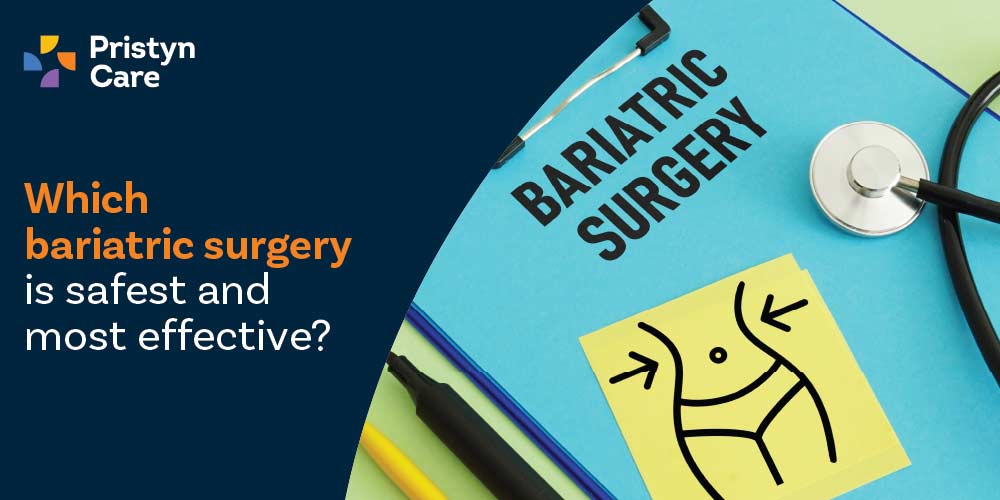![]() Views: 46
Views: 46
Which Bariatric Surgery is Safest and Most Effective?
Dedicated Support at Every Step!
Our Doctors are available 24 hours a day, 7 days a week to help you!
Bariatric surgery is a weight-loss procedure that helps individuals with severe obesity by reducing the size of the stomach or rerouting the digestive tract. It is effective for long-term weight management and can improve or resolve related health conditions such as diabetes and hypertension. The surgery requires a commitment to lifestyle changes, including diet and exercise, for optimal results.
Bariatric surgery can be roughly divided into the following methods, each with its own set of pros and cons and eligibility criteria.
Table of Contents
Sleeve Gastrectomy
Sleeve gastrectomy is a popular weight loss surgery where the doctor removes part of the stomach, leaving a narrow “sleeve” that can hold less food. This procedure is suitable for individuals with a body mass index (BMI) of 40 or higher, which typically means they are 100 pounds or more over their ideal body weight.
Advantages:
- It helps to reduce the amount of food you can eat at a single time, thereby aiding weight loss.
- It reduces the production of the hunger hormone, ghrelin, leading to less cravings.
Disadvantages:
- It's not reversible since a part of the stomach is permanently removed.
- There's a risk of nutrient deficiencies due to reduced food intake.
No Cost EMI, Hassle-free Insurance Approval
Gastric Bypass Surgery
Gastric bypass surgery, known medically as Roux-en-Y gastric bypass, is often recommended for individuals who are severely obese (BMI of 40 or above) or those with a BMI between 35 and 39.9 and serious health conditions related to obesity such as type 2 diabetes or high blood pressure. The doctor creates a small pouch at the top of your stomach, which becomes the only part that receives food. This significantly reduces your food intake and results in weight loss.
Advantages:
- Rapid and significant weight loss.
- Improvement in obesity-related health conditions.
Disadvantages:
- It's complex and has higher risk for complications compared to other weight-loss surgeries.
- It may cause long-term vitamin and mineral deficiencies.
Adjustable Gastric Band
Adjustable gastric banding is another type of weight loss surgery. It involves placing an inflatable band around the upper part of your stomach to create a small pouch above the band with a narrow opening to the rest of your stomach. Like other surgeries, it's intended for individuals with a BMI of 40 or higher or those with a BMI between 35 and 39.9 with severe obesity-related health conditions.
Advantages:
- It's reversible and adjustable.
- No cutting of the stomach or rerouting of the intestines.
Disadvantages:
- Slower weight loss compared to other surgeries.
- The band may slip or erode into the stomach over time.
Gastric Banding
Gastric banding is similar to adjustable gastric banding, but the band is not adjustable. The same BMI criteria apply for this surgery.
Advantages and disadvantages are same as adjustable gastric banding, with the key disadvantage being that it's not adjustable.
Revision Weight Loss Surgery
In some cases, a second surgery, known as revision weight loss surgery, may be necessary if the initial surgery did not result in enough weight loss or if you have problems related to the first operation. The risks and benefits of this procedure should be discussed thoroughly with your doctor. This is typically considered only after non-surgical options have been exhausted.
Bariatric Surgery: The Best Choice Varies
Bariatric surgery, also known as weight loss surgery, is a medical intervention aimed at aiding individuals in losing significant weight, especially those who struggle with obesity. However, the question "Which bariatric surgery is the best?" is subjective. It greatly depends on various factors such as the patient's health condition, lifestyle, weight loss goals, and, importantly, the doctor's choice.
To ensure successful outcomes from the surgery, it is crucial to consult with a specialised doctor. They will evaluate your overall health condition and determine the most suitable type of bariatric surgery for you. In India, some of the commonly performed bariatric surgeries include Gastric Bypass, Sleeve Gastrectomy, and Adjustable Gastric Banding.
Factors Influencing the Choice of Bariatric Surgery
Deciding which bariatric procedure is best largely depends on individual health conditions and needs. Here are some key factors that doctors consider:
- Current Body Mass Index (BMI): This is a measure of body fat based on an individual's weight and height. A higher BMI often indicates severe obesity and may necessitate a more intensive procedure like Gastric Bypass.
- Co-existing Medical Conditions: If an individual suffers from conditions like diabetes or heart disease, certain types of bariatric surgeries may be more beneficial than others.
- Lifestyle: A patient’s commitment to long-term lifestyle changes post-surgery also influences the choice of procedure. For instance, Sleeve Gastrectomy requires substantial dietary changes compared to Adjustable Gastric Banding.
Remember, your doctor will guide you through this process and help you make an informed decision about which bariatric surgery would be most suitable for you.
The Doctor's Choice in Bariatric Surgery
In addition to patient-specific factors, a doctor’s preference and expertise also play a considerable role in determining the best bariatric surgery. Some doctors prefer certain procedures due to their success rates, while others may be more skilled or experienced in performing specific surgeries.
For instance, a doctor might recommend Sleeve Gastrectomy over Gastric Bypass if they believe it would yield the best results for the patient's unique circumstances. Hence, open communication and trust between the patient and doctor are vital in choosing the most appropriate bariatric surgery.
End Note
Ultimately, considering bariatric surgery is a significant step towards better health and improved quality of life for those struggling with obesity. While costs can seem high at first glance, remember that these procedures are often life-saving treatments for people fighting conditions such as diabetes or heart disease linked to obesity. It's a worthwhile investment in your health and future. Consult with your doctor to understand which type of bariatric surgery is the most suitable for you and remember to factor in all potential costs when making your decision.
FAQs
1. What is bariatric surgery?
Bariatric surgery refers to a group of procedures that are performed to help a person lose weight. These surgeries function by altering the digestive system in a way that facilitates weight loss, either by limiting how much you can eat, changing how your body absorbs calories and nutrients, or both.
2. Which bariatric surgery is considered to be the safest?
The gastric banding procedure is generally considered to be the safest as it is less invasive than other surgeries. It involves placing a band around the top part of the stomach to create a small pouch that limits food intake. However, safety can vary depending on individual patient conditions and the skill and experience of the surgeon.
3. What is the most effective bariatric surgery?
The Roux-en-Y Gastric Bypass is often cited as the most effective bariatric surgery because of its high success rates in terms of significant long-term weight loss. However, what's most effective can also depend on the individual's lifestyle changes post-surgery and how well they adhere to dietary guidelines.
4. Is there a minimally invasive bariatric surgery option?
Yes, laparoscopic procedures have made most types of bariatric surgeries minimally invasive these days. The surgeon makes small incisions in the abdomen to operate, which leads to less pain, reduced scarring, and faster recovery times compared to traditional open surgery.
5. Can everyone undergo bariatric surgery?
No, not everyone is eligible for bariatric surgery. Typically, candidates for this kind of procedure are those with a Body Mass Index (BMI) above 40 or those with a BMI above 35 who also have serious weight-related health issues such as type 2 diabetes, high blood pressure, or severe sleep apnea.
6. How long does it take to recover from bariatric surgery?
Recovery times vary depending on the type of bariatric surgery performed and the overall health of the patient. Generally, patients can return to normal activities within 3 to 5 weeks post-surgery.
7. Are there any side effects of bariatric surgery?
Yes, like any surgery, bariatric procedures have potential side effects and risks. These may include infection, blood clots, nutritional deficiencies, gallstones, and in rare cases, leakages in the gastrointestinal system.
8. What lifestyle changes are required after a bariatric surgery?
Post-surgery, patients must commit to a healthy diet that is low in sugar and fat, and high in protein. Regular exercise, sufficient sleep, and regular follow-ups with their doctor are also crucial for maintaining long-term weight loss and health.
9. Can I gain weight again after undergoing bariatric surgery?
While bariatric surgeries greatly aid in weight loss, they are not a guarantee against weight regain. Long-term success depends on your commitment to dietary changes, regular exercise, and overall lifestyle modifications.
10. How can I maintain my weight loss after bariatric surgery?
To maintain weight loss after bariatric surgery, it's important to adhere to your doctor's nutritional advice, stay active with regular exercise, attend all follow-up appointments, and seek counseling or join a support group to help deal with emotional challenges.









